Intel Core i7-11700K Review: Blasting Off with Rocket Lake
by Dr. Ian Cutress on March 5, 2021 4:30 PM EST- Posted in
- CPUs
- Intel
- 14nm
- Xe-LP
- Rocket Lake
- Cypress Cove
- i7-11700K
Gaming Tests: Final Fantasy XIV
Despite being one number less than Final Fantasy 15, because FF14 is a massively-multiplayer online title, there are always yearly update packages which give the opportunity for graphical updates too. In 2019, FFXIV launched its Shadowbringers expansion, and an official standalone benchmark was released at the same time for users to understand what level of performance they could expect. Much like the FF15 benchmark we’ve been using for a while, this test is a long 7-minute scene of simulated gameplay within the title. There are a number of interesting graphical features, and it certainly looks more like a 2019 title than a 2010 release, which is when FF14 first came out.
With this being a standalone benchmark, we do not have to worry about updates, and the idea for these sort of tests for end-users is to keep the code base consistent. For our testing suite, we are using the following settings:
- 768p Minimum, 1440p Minimum, 4K Minimum, 1080p Maximum
As with the other benchmarks, we do as many runs until 10 minutes per resolution/setting combination has passed, and then take averages. Realistically, because of the length of this test, this equates to two runs per setting.
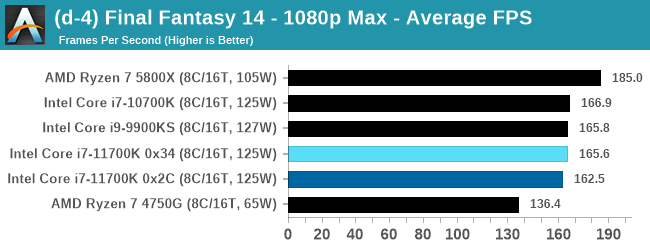
| AnandTech | Low Resolution Low Quality |
Medium Resolution Low Quality |
High Resolution Low Quality |
Medium Resolution Max Quality |
| Average FPS | 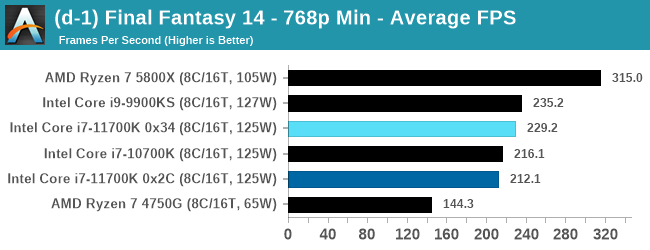 |
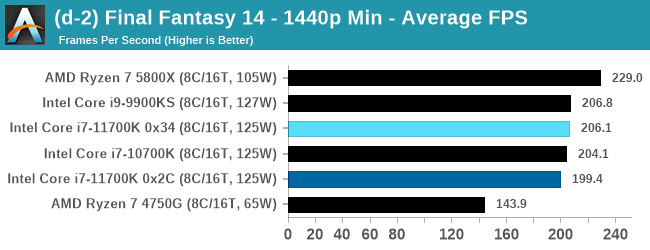 |
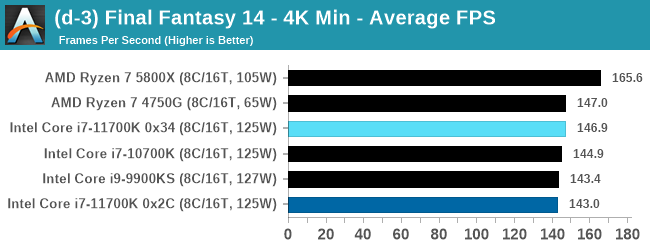 |
 |
As the resolution increases, the 11900K seemed to get a better average frame rate, but with the quality increased, it falls back down again, coming behind the older Intel CPUs.
All of our benchmark results can also be found in our benchmark engine, Bench.


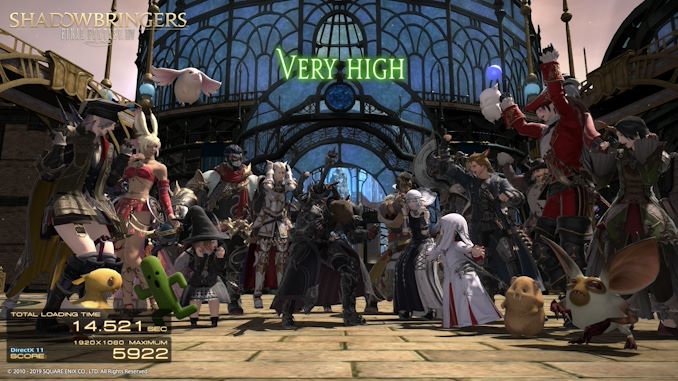








541 Comments
View All Comments
Franseven - Monday, March 8, 2021 - link
I know is a strange request, but i would like to know the iris integrated graphics benchmarks since i'm using my old 2080 ti for mining and i'm playing Minecraft and simple games with my integrated uhd630 of my 9700k, and unfortunately 5900x does not have integrated graphics, so i would like to know 11700k and 11900k perf with that, i have seen mobile benchmarks but as you know, is not the same thing, would like to see quality gaming benchmark as always, from you. thankskmmatney - Monday, March 8, 2021 - link
Would also be interested in this. I sold my 2070 Super - I owned it for a year, and sold it for what I paid (so free card for a year). The idea was to buy a 30X0 card with that money. That didn't happen, so lately I've just been playing Minecraft and older games on an old GTX 460. I'm curious about how the Xe graphics compares - with current prices on Ebay, the graphics along can add about $60 worth of value to the cpu.terroradagio - Monday, March 8, 2021 - link
ASUS just released another BIOS update with Rocket Lake enhancements. Probably more to come closer to the release too. This is why you don't post your review 3 weeks early.Everett F Sargent - Monday, March 8, 2021 - link
Like maybe an AVX-512 down clocking offset? Either Intel released their Rocket Engine a quarter too early or no amount of BIOS tweaking can do what you think it can do, at this, or any, point in time.From this review "Looking at our data, the all-core turbo under AVX-512 is 4.6 GHz, sometimes dipping to 4.5 GHz. Ouch. ... Our temperature graph looks quite drastic. Within a second of running AVX-512 code, we are in the high 90ºC, or in some cases, 100ºC. Our temperatures peak at 104ºC ... "
So already thermal throttling at Intel's promised 4.6 all core frequency using AVX-512. Makes you wonder what it takes to significantly OC this CPU. Which, you know, has barely been mentioned here in the comments section, OC'ing the damn thing, north or south of 300W or ~300W ...
https://i.imgur.com/8BEsGVo.png
terroradagio - Tuesday, March 9, 2021 - link
I guess you missed also the spot where normal AVX used less power than the 9900k. The vast majority don't care about AVX-512. It is just there so Intel can say it is. People who buy Rocket Lake will be interested because of gaming and there will probably be more stock than 7nm products from AMD.Qasar - Tuesday, March 9, 2021 - link
wow. really ? one test ( of a few) where intel was faster, and used less power ? big deal. over all rocket lake, looks to be a joke." People who buy Rocket Lake will be interested because of gaming " wrong, i know a few peope who are not even looking at intel, and are just waiting for zen 3 to be available, and this is for gaming and non gaming usage.
terroradagio - Tuesday, March 9, 2021 - link
I pointed out facts, and you are cherry picking one very selective AVX 512 test. Go away fanboy.Qasar - Tuesday, March 9, 2021 - link
like you your self have been doing ? and showing how much you love intel?hello pot meet kettle.
Everett F Sargent - Tuesday, March 9, 2021 - link
Yes, a 5.0GHz (all core boost clock) at 231.49W for the i9-9900KS versus a 4.6GHz (all core boost clock) at 224.56W for the i7-11700K. Conclusion? The i7-11700K runs 20-25W higher at the same all core boost frequency (4.6-5.0GHz). The i7-11700K wins at test duration though (by a similar margin as the inverse of the power ratio). The CPU energy used is about the same for both.amanpatel - Monday, March 8, 2021 - link
Few questions:1) Why is apple silicon or ARM equivalents not part of the benchmarks?
2) Why are so many CPU benchmarks needed, especially if they don't tell anything significant about them.
3) I'm not a huge gamer, but I also don't understand the point of so many gaming benchmarks for a CPU review.
Perhaps I'm the wrong audience member here, but it does seem a whole lot of charts that roughly say the same thing!